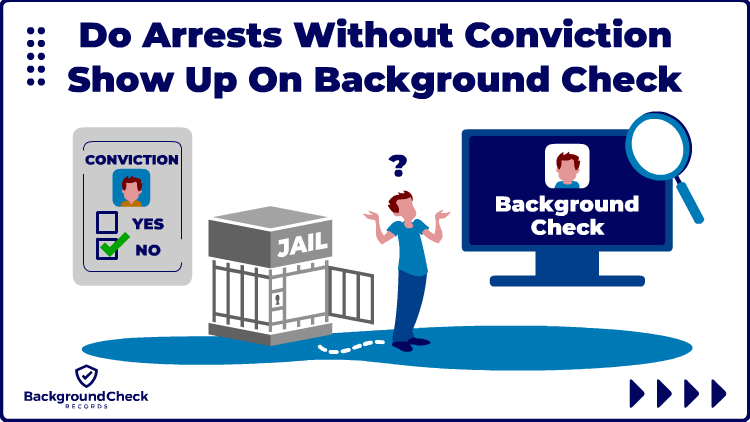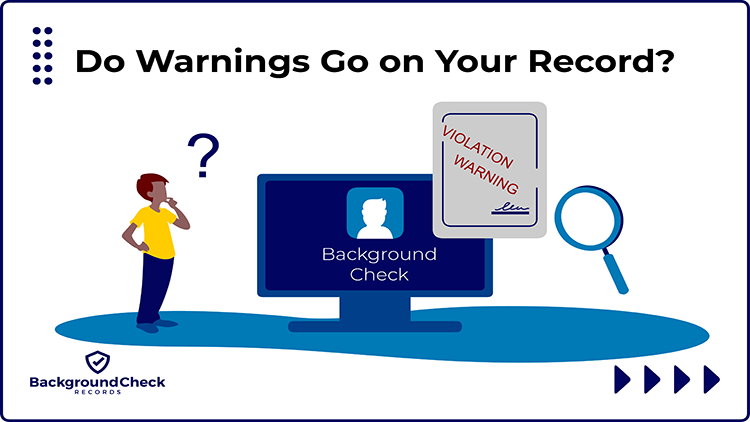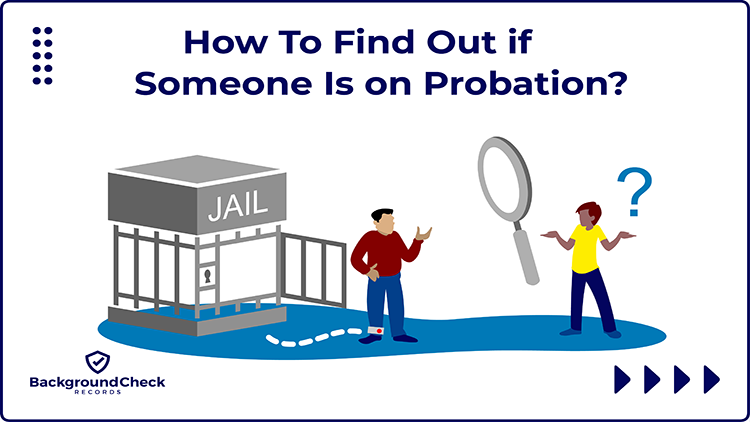Do Arrests Without Conviction Show Up on Background Check or Just Convictions?
Understanding how arrests are handled after being made is crucial, especially considering that a significant number of arrests—over 10 million annually in the U.S.—do not always result in convictions due to cases being dropped, dismissed, sealed, or expunged.1
Therefore, the distinction between arrests and convictions is important when assessing their appearance on background checks.
Therefore, anyone can check their own record using the search form above to figure out if the arrest appears on their record or the next easiest option is to sort through each state’s laws seen below.
Although those who are willing to dig through public records can find out which charges show up on a record, where to look, and applicable laws on sealing and expunging records to prepare for an upcoming background check.
Will Arrests Appear on a Background Check Even Without a Conviction?
When individuals face arrest, their concern typically revolves around whether records of arrests without resulting convictions appear on background checks for employment or housing, as opposed to only convictions. Despite various protections and the introduction of clean slate legislation in several states, the criteria for inclusion in such background checks remains inconsistent across different jurisdictions.
Information on whether dropped charges appear on a background check varies by state. In California, misdemeanor arrests without conviction may be expunged, whereas felony arrests typically cannot. Maine does not provide expungement relief for non-conviction arrests under current legislation.
Visibility of Arrest Records on Background Checks After Being Dropped, Dismissed, Expunged, or Sealed
Laws and policies concerning background checks differ across states. In certain states, background checks may include dismissed or dropped charges, while others have enacted legislation mandating the automatic removal of non-convictions from an individual’s criminal record.
Still, other states require someone to file a petition with the court to have a non-conviction sealed or expunged from their record. It’s vital to understand how the laws work in each state when someone is charged but not convicted of a crime. Since a criminal record can limit a person’s job prospects, housing, and other aspects of their lives, knowing when a charge should not appear can help those individuals.
Does an Arrest Without a Conviction Appear on Background Checks in My State?
When seeking information about a specific state’s laws, individuals might inquire whether an arrest without conviction will appear on a background check in that state and what legal provisions apply. Additionally, the visibility of warrants on background checks depends on whether the associated arrest has been resolved. Typically, warrants do not appear on routine screenings unless the underlying arrest remains unresolved.
As stated earlier, some states have passed legislation making the removal of non-convictions automatic, while others require a petition to expunge. The process for misdemeanors and felonies can also differ regarding charges but no convictions.
Regardless of which state the criminal record is run in, there are some protections against the use of arrests with or without conviction on the federal level. Title VII of the Civil Rights Act of 1964 prohibits the discriminatory use of criminal records in hiring practices. When criminal history is used based on a person’s race or national origin, it is a violation of Title VII.2
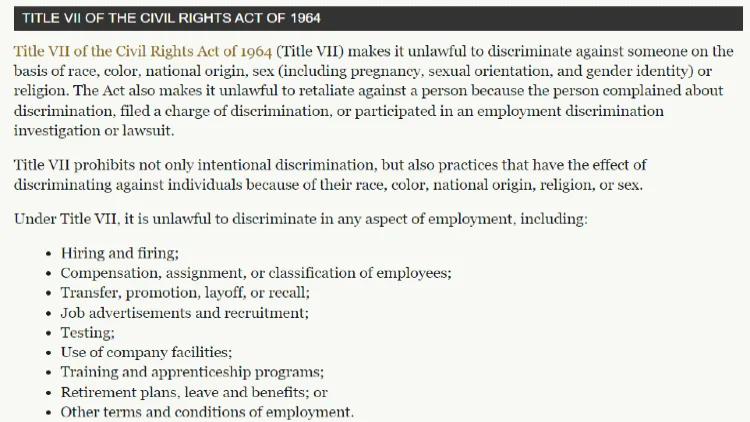
The Equal Employment Opportunity Commission enforces these laws and provides guidance on how arrest records should be used when making hiring decisions. Specifically, guidance states a record in and of itself unless the arrest or conviction would directly impact a person’s ability to perform the job duties.2
Details of each state’s laws regarding arrests and criminal records are outlined below.
State Laws About Arrests Without Convictions & Employment Background Checks
States establish their own regulations and guidelines regarding the utilization of arrest records and the inclusion of convictions and non-convictions in background check reports. Understanding the specific laws applicable to the jurisdiction where the record is being processed is crucial to ensuring compliance with local regulations.
For the most part, unless a record is sealed or expunged, an arrest can appear on a criminal background check in any state.
Alabama
Alabama passed the REDEEMER Act which stands for Record Expungement Designed to Enhance Employment and Eliminate Recidivism Act. This act allows for the expungement of misdemeanor charges that did not result in conviction after a certain time period has passed following a charge or arrest.
Specifically, the time frame is 90 days from when charges have been dismissed with prejudice, a grand jury has handed down a no-bill, or the individual was found not guilty at the hearing. After that 90 day period has passed, the defendant can petition the court to expunge a misdemeanor non-conviction.
Alaska
Alaska limits the publication of records that resulted in a not guilty verdict or were dismissed based on Statute 12.62.160(b)(8) and Statute 13 AAC 68.310. While this doesn’t expunge the record, it does limit its availability for criminal background checks.
Cases can only be sealed in Alaska when the conviction was the result of mistaken identity or the defendant was falsely accused. Otherwise, Alaska does not have expungement relief codified in its laws per Statute 12.62.180(b).
Arizona
Arizona Statute 13-911 allows defendants to petition the court to seal criminal records when a person was charged with an offense that was later dismissed or resulted in a not guilty verdict, or when a person was arrested for a crime but charges were not filed.
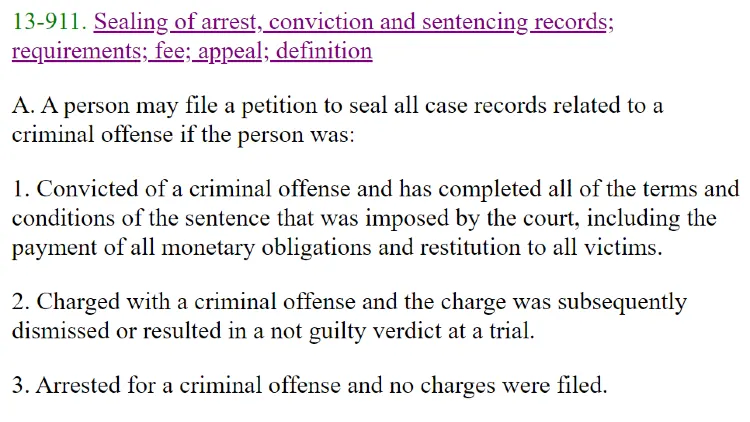
The wait time before a person can petition the court to seal records are 2 years for class 2 and 3 misdemeanors, 3 years for a class 1 misdemeanor, 5 years for a class 4-6 felony, and ten years for a class 2 or 3 felony. Class 1 felonies cannot be sealed in Arizona.3
Arkansas
Arkansas passed the Comprehensive Criminal Record Sealing Act in 2013 which allows defendants who have been arrested and not charged with a crime or those who have been charged but the charges were dismissed or returned a not guilty verdict at trial to petition the court to seal the record.
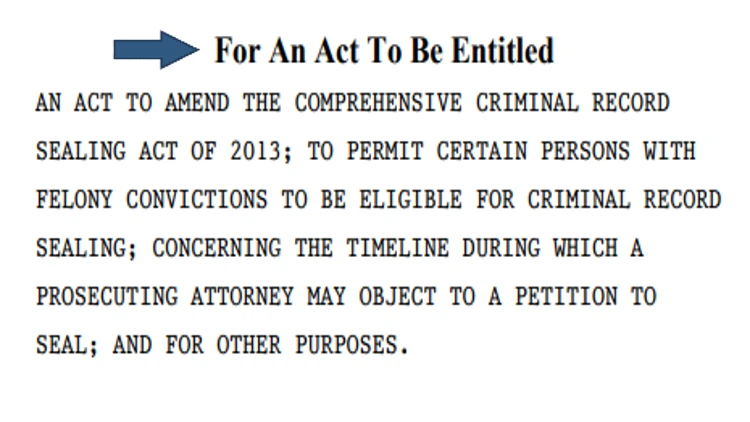
In 2019, House Bill 1831 shortened or eliminated waiting periods for petitioning the court to seal records. Additional amendments to the bill were passed in 2021 through House Bill 1256.
To seal a non-conviction record, the prosecutor’s office and the law enforcement agency that made the arrest must be served with notice that the defendant is asking the court to seal the record. The court can refuse to seal the record if doing so would present a risk to the public as well per Statute 1415(d).
California
California’s Fair Chance Act prohibits employers from considering or inquiring about any arrests that did not result in a conviction or any charges that resulted in a non-conviction by either being dismissed or the defendant was acquitted for misdemeanors only.
Additionally, in 2021, California passed legislation Assembly Bill 145 that mandated non-conviction records from 1973 to the present would be sealed automatically by the court.
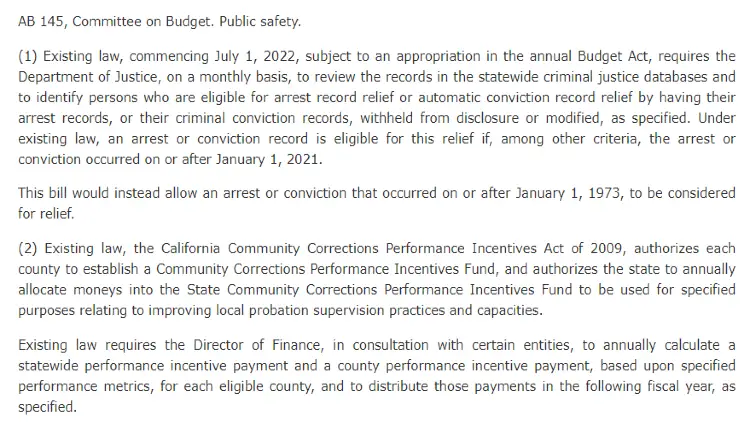
Prior to the passage of this act, defendants were required to petition the court to have these records sealed.
Colorado
Colorado’s House Bill 1214 allows for individuals to petition the court to seal non-conviction records if 18 months has passed since an arrest on a misdemeanor charge without a conviction or if the misdemeanor has a statute of limitations of 18 months or less. Regarding felonies, the wait period is three years after a felony arrest when no charges have been filed following an arrest and the felony has a 3 year statute of limitations.
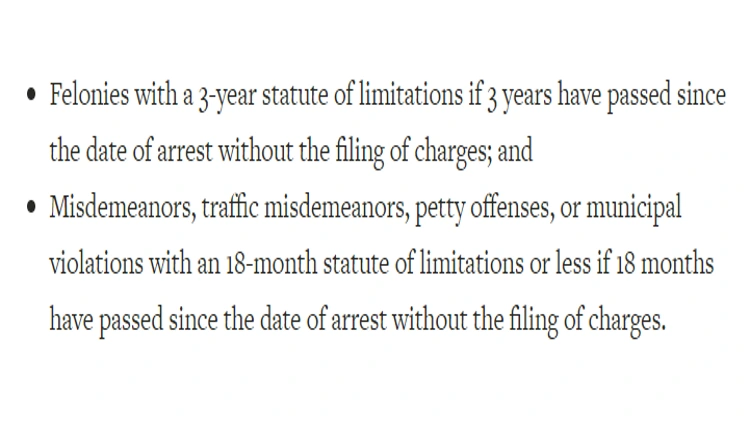
Felony arrests for offenses that have a statute of limitations greater than 3 years are not eligible for sealing by the court in Colorado.
Colorado Statute 24-72-705(1)(a) further requires that the court automatically order a record be sealed when the case is completely dismissed by the judge or prosecutor, or when the case returns a verdict of not-guilty following a hearing.
Connecticut
In Connecticut, 13 months after charges are dismissed or result in an acquittal can be erased from a person’s criminal record automatically per Statute 54-142a(a),(b),(c).
When the dismissed or acquitted charge is included in a case with other charges that result in a conviction, the dismissed or acquitted matter cannot be erased or sealed per Statute 15-142a(g).
Statute 31-35i also prohibits denying someone a job based on erased records. In other words, if a record is erased, but the employer learns of the arrest anyway, the employer cannot use the arrest as a basis for denying employment.
Delaware
Delaware’s Senate Bill 37 passed in 2019 allowed for the automatic expungement of all cases that are ended in favor of the defendant including deferred prosecutions, dropped charges and arrests that were not followed by formal charges within one year of the arrest, and cases that resulted in a not-guilty verdict at trial.
In 2021, Senate Bills 111 and 112 increased the types of offenses that can be considered for automatic expungement as well and will be in full force and effect by 2024. This allows for even more protections for those who have been arrested and not charged or charges that resulted in non-convictions.
Florida
Florida passed H7125 in 2019 which immediately sealed charges that were dismissed. This included those dismissal following supervision on deferred prosecutions where all conditions were met.
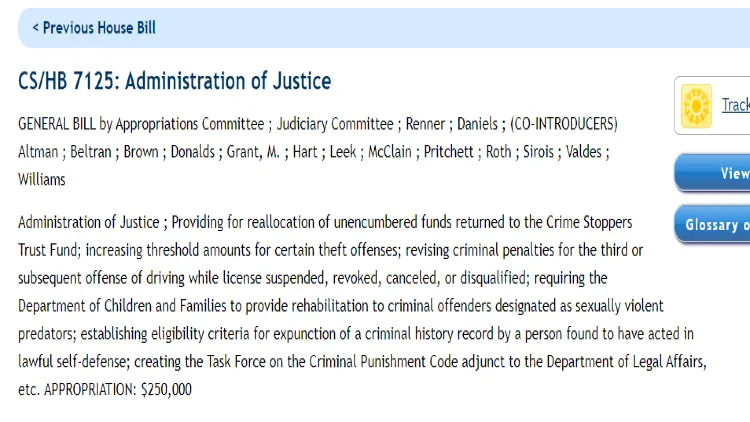
Ten years following sealing the case, the sealed charge becomes eligible for expungement. Violent felonies are not eligible to be sealed or expunged under Florida law, and records can only be sealed if there are no prior convictions and has not had other records sealed or expunged.4
Georgia
Georgia law allows for automatic restrictions on releasing records for certain situations depending on the date the charges were filed or the arrest occurred. If the arrest occurred July 1, 2013, per Georgia Code 35-3-37(h)(1), the defendant must submit an application to restrict the record when charges have been dismissed.
If the arrest was after July 1, 2013, the Record for Crime Information Center will automatically restrict a criminal record for an arrest that resulted in a non-conviction as soon as the Center is notified of the dismissal or acquittal.5
Georgia Code 35-3-37(h)(2)(B), 16-13-2, known as the First Offender Act, also allows for sealing and restricting records for first time offenders of drug possession when the person successfully completes the conditions of deferred prosecution.6
Hawaii
In Hawaii, per Statute 831-3.2, a defendant can submit an application to the Attorney General’s office to have a record expunged for an arrest that did not result in a conviction unless it was a case where the defendant absconded.
Expunging a record is also available one year after all the terms of a deferred prosecution have been met and the charges have been dismissed.
Public criminal records do not include arrests or charges that resulted in non-convictions. Non-conviction information is only available to criminal justice agencies or other governmental agencies with a need to know.
Idaho
In Idaho, one year after an arrest or charge that has resulted in a non-conviction, the defendant can petition the court to expunge the matter from the person’s record per Statute 67-3004(10).
Non-convictions include charges that are dismissed before going to trial, acquittals following a hearing, and arrests which did not result in a formal charge one year after the date the person was taken into custody.
Illinois
According to Statute 2630/5.2(i) in Illinois, law enforcement agencies must automatically expunge arrest records if no charges are filed within one year of arrest, if charges are dismissed, or if the individual is acquitted after a hearing. As for police reports appearing on background checks, while police departments may release reports publicly, they typically do not surface on background checks unless a specific request is made to the department holding the record.
The statute also sets the following timeline for expunging non-convictions and removing them from the public record: arrests after 2013 by 1 January 2021, arrests between 2000 to 2013 by 1 January 2023, and all records prior to 2000 must be expunged by 1 January 2025 for all non-convictions.
Indiana
Senate Bill 182 provides relief for Indiana residents who were arrested but not convicted by allowing automatic expungement when certain criteria is met. All pending charges must have been dismissed, not just one charge in a group of complaints.
Arrests and charges that resulted in an acquittal following trial are also eligible for automatic expungement, or when a conviction or true bill of indictment is vacated. Vacated means the plea has been withdrawn and the matter dismissed by a judge.
Iowa
Starting 1 January 2016, arrests and charges that resulted in non-conviction in Iowa are eligible for expungement if the prosecution or the defendant submits an application to the court requesting the matter be removed from the person’s public criminal record.
Per Statute 910C.2(a)(1), this includes matters that were dismissed or the defendant was acquitted.
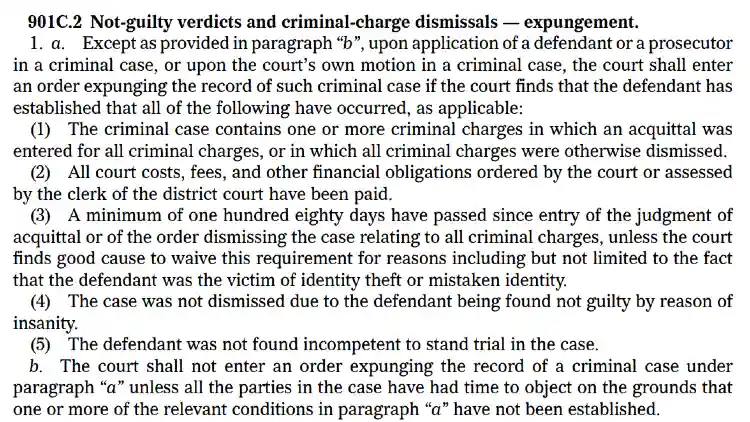
Once the record is expunged, it is not part of a person’s criminal record and cannot be accessed by potential employers or landlords as part of a routine background check.
Kansas
Per Kansas Statute 22-2410, a defendant can petition the court to expunge records of an arrest or charges when certain conditions have been met. If the arrest was made based on mistaken identity or if the court finds that law enforcement did not have adequate probable cause to make an arrest it is eligible for expungement. Additionally, if the person was acquitted after hearing.
For an expungement to be granted, the court must find that it is in the public’s interest to erase the record. The court must also determine that the charges have been fully dismissed and are not likely to be reinstated in the future.
Kentucky
Kentucky passed House Bill 237 in 2020 which made expungement of arrests and charges that were dismissed with prejudice or those that resulted in an acquittal at trial automatic for cases that were disposed of on or after 27 March 2020.
Cases disposed of prior to that date with similar dispositions can be expunged when the defendant files a petition 60 days or more following the dismissal or acquittal. This also includes felony arrests that result in no true bill of indictment.
Louisiana
Louisiana CCRP 976 allows a defendant to file a motion to expunge an arrest record immediately following the dismissal of the charges against them with prejudice by the district attorney. This includes dismissals made following successful completion of a deferred prosecution. This statute also covers individuals who were tried and acquitted.
Louisiana CCRP 973 prohibits disclosing an expunged arrest record to the public once the order has been entered to erase the record.
Maine
Maine does not have a process for expunging arrests that resulted in non-conviction, including acquittals, dismissals, and felonies where no true bill was handed down. Individuals in Maine must rely on federal protections if they feel they have been unlawfully denied employment due to an arrest with no conviction.7
Maryland
House Bill 201 in Maryland provides automatic relief to defendants arrested and later acquitted or charges were dismissed by the courts with prejudice. The wait period is 3 years following the dismissal or completion of a deferred prosecution and applies to matters heard from 1 October 2021 and after.
Drug treatment cases are not automatically sealed; however, the defendant can petition the court to expunge the record when all treatment requirements have been met and the wait time has expired.
For individuals arrested from 1 October 2007 or after, when the case resulted in a non-conviction, Criminal Procedure 10-103.1 orders all records of the arrest be destroyed within 60 days automatically.
If the dismissed or not-guilty charge is in conjunction with other charges that result in a conviction, the non-conviction charge cannot be expunged pursuant to Criminal Procedure 10-107, and expunged cases can only be reopened by a court order pursuant to Criminal Procedure 10-108.
Massachusetts
In Massachusetts, per General Law Chapter. 276, Section 100C, states that when a person is arrested, but the trial results in an acquittal, the record must be sealed immediately following the disposition. Automatic sealing also must occur for no true bill felonies, and in cases where the court has found there is no probable cause to proceed and the charges are dismissed.
The only exception applies to cases where immediate sealing is not granted because it would not substantially serve justice. In those cases, there is a waiting period before the defendant can petition to have the arrest sealed from public record. Certain conditions during that waiting period must be met such as no additional charges. Exceptions are outlined in General Law Chapter 276, Section 100A.
Michigan
When a person is arrested in Michigan, and the arrest does not result in a conviction, Act 289 of 1925 orders law enforcement to destroy any records of the arrest including biometric information and fingerprints upon receipt of notice that charges have been dismissed or the person has been found not guilty. Act 289 of 1925 further orders the clerk of court’s office to destroy or expunge files where the defendant was acquitted following the hearing.
Minnesota
Successful deferred prosecution cases and other arrests that resulted in a non-conviction by acquittal are eligible for expungement under Minnesota Statute. 609A.02, subsection 3(a)(1).
For cases that result in acquittal, expungement petitions can be filed immediately following the action. Deferred prosecution cases that are successfully completed and dismissed have a one year waiting period for expungement.
Per Minnesota Statute 299C.105, when cases are dismissed prior to probable cause being determined, expungement is automatic regarding arrest records providing the person has not had any other convictions in the 10 years prior to the dismissal. These matters do not fall under 609A.02 for expungement, and gross misdemeanors or felonies are not eligible for expungement.
Mississippi
House Bill 1352, Section 34 expanded Mississippi’s relief protections offered under Mississippi Code 99-19-71(4) which allows for the expungement of arrest records in cases where charges were not formally filed or were dismissed by the prosecution with prejudice, and in cases where the defendant was acquitted following trial.
The defendant must petition the court to request expungement of records following a dismissal, no true indictment or acquittal of charges.
Missouri
Under Missouri’s Revised Statute 610.105(1), when an arrested person is charged, but the charges are later dismissed or nulled, or result in a non-conviction, the record is considered closed to the public and is only open to law enforcement and other governmental agencies with a need to know status.
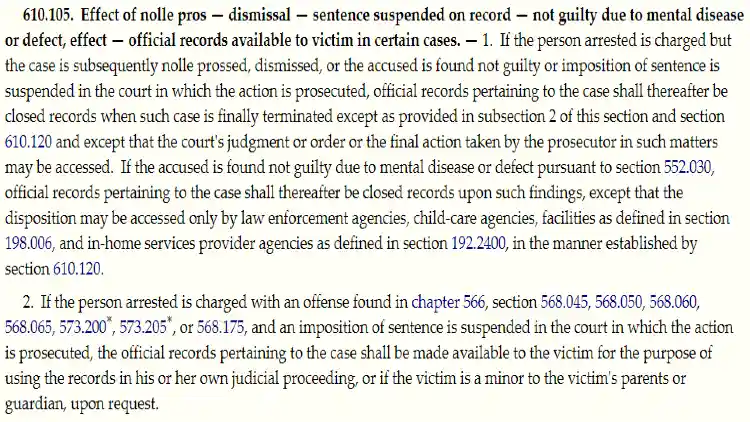
In 2018, Missouri passed Senate Bill 588 which made expungement possible in certain non-conviction matters; however, expunged records can still be accessed by law enforcement or governmental agencies with a need to know based on the same rules for closed records.
When arrests are made based on false allegations or mistaken identity, and the person has no prior convictions, under Revised Statute 610.122, all records are ordered to be destroyed and removed from state and federal criminal record databases.
Montana
When a person is arrested in Montana, but later released without charges being filed, or is acquitted of charges, or charges are later vacated by the court, within 14 days of the action, per Montana Code 44-5-202(8), the state repository must return all fingerprints and photographs taken to the agency that originated the action. That agency must then destroy those records of the non-conviction record.
Nebraska
Individuals arrested but not convicted due to dismissals, acquittals or vacated charges can get relief under Nebraska Revised Statute 29-3523. Under this law, records resulting in non-convictions are automatically removed from public record; however, these records can be accessed by law enforcement.
The wait time is one year following the prosecution’s decisions to dismiss charges, unless it is a dismissal following a deferred prosecution where the wait time is two years.
The statute further states employers, licensing boards or other entities are prohibited from questioning the individual about these sealed records.
Nevada
In Nevada, arrestees who are not convicted can seek relief under Nevada Revised Statute 179.255. For arrests that were later dismissed a person can petition the court for expungement of the record after the statute of limitations for the charge has expired, or 8 years, or the person can petition at a time stipulated by both the defense and the prosecution.
If it is a case of unlawful arrest due to a false allegation, mistaken identity or other unlawful detainment, the person can file a petition immediately following dismissal based on AB 315 of the Nevada Code.
New Hampshire
Starting 1 January 2019, arrestees in New Hampshire whose cases are later dismissed with prejudice or there was no prosecution, can have their arrest and court records annulled 30 days following the dismissal or acquittal based on New Hampshire Revised Statute 651:5(II-a)(a).
Per 651:5 Annulment of Criminal Records, once the records have been annulled, they are no longer considered public records, so the arrest cannot appear on a routine background check.7
New Jersey
New Jersey’s 2019 Statute 2C:52-6(a)(1), allows for automatic expungement of arrest records when the arrest charges were dismissed, the person was found not guilty or acquitted by the court following the hearing, or the person was released without a conviction or determination of guilt.
Once the case results in non-conviction, the Superior Court orders expungement of all records including arrest information making it inaccessible to the public.
New Mexico
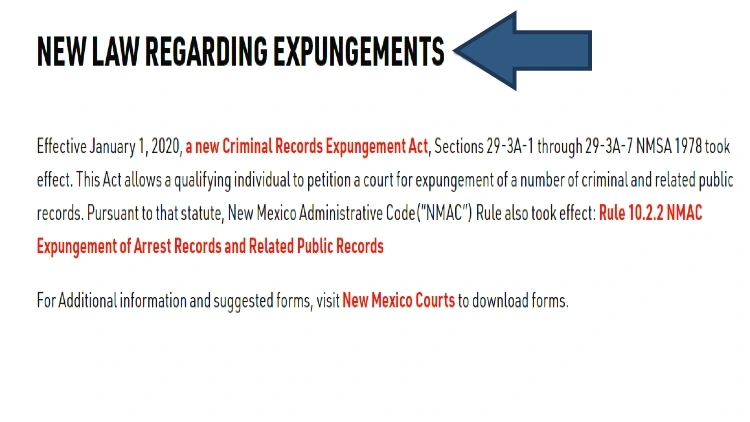
New Mexico passed the Criminal Record Expungement Act in 2020 which allows eligible defendants to petition the court to erase records of arrest when there is no conviction. This includes dismissals, acquittals, and successful completion of deferred prosecution.
New York
In New York when action is terminated in favor of the defendant, the arrest is eligible for automatic expungement per Statute 160-50(1). This includes dismissals, acquittals and successful completion of deferred prosecutions.
Once the record is expunged, it is no longer available to the public and cannot be accessed in a background check.
North Carolina
North Carolina’s Second Chance Law, passed in 2020, provided automatic expungement for most arrests that resulted in non-conviction. GS 15A-146(a4) outlines the authority of the court to order expungement once the case is disposed of in favor of the defendant.
Per the Second Chance Act, all charges being tried together must be dismissed or return an acquittal to be eligible for expungement, and it erased any previous waiting periods to request expungement.
North Dakota
In North Dakota, under Statute 41(r)(b)(9); (6)(a), the public cannot access any records when a case is dismissed based on a successful deferred prosecution or pre-trial diversion plan.
In State vs Howe, North Dakota further expanded the court’s authority to expunge records, including arrests, when the case is disposed in the defendant’s favor via dismissal or acquittal.
Ohio
In Ohio, per Ohio Statute 2953.52(A), the court can seal court records when the case is dismissed or the defendant is acquitted following a hearing. The defendant can file a petition to seal the records after the dismissal or acquittal, a two year waiting period when there is no true bill of indictment handed down, and once the statute of limitations has expired after the dismissal.
It is unclear in Ohio law how arrest records maintained by the law enforcement agency are handled regarding expungements at this time.
Oklahoma
In Oklahoma, when the person does not have any felony convictions, there are no pending felony or misdemeanor charges, and the current arrest and charge results in a non-conviction, including dismissals and acquittals, the records can be expunged upon petition to the court per Oklahoma Statute 18(A)(7).
Per Oklahoma Statute 18(A)(1)-(5), arrest records are eligible for expungement when the charges have been dismissed, if the person was arrested and no charges were filed, or if the person was acquitted following a hearing.
Background Check Inquiries Regarding Arrests Without Conviction in Oregon
The guidance for setting aside or expunging an arrest record can be found in Oregon Statute 137.225(1)(b). Essentially, any arrest where charges are not filed within 60 days of the arrest are eligible for expungement following the waiting period. Additionally, if a case is dismissed by the prosecution or the trial results in an acquittal, the records may be expunged immediately following a petition by the defendant.
Pennsylvania
Pennsylvania passed the Clean Slate Act in 2018 which provided relief for individuals arrested but not convicted due to a dismissal or acquittal. The Act allows for an order of limited access to the records in these circumstances making them only accessible to law enforcement or governmental agencies on a need to know basis.
Rhode Island
Under Rhode Island’s, General Law 12-1-12.1(a), a person who was arrested but was not charged, had charges dismissed or was acquitted following a hearing can petition the court to seal the record of arrest making it inaccessible to the public.
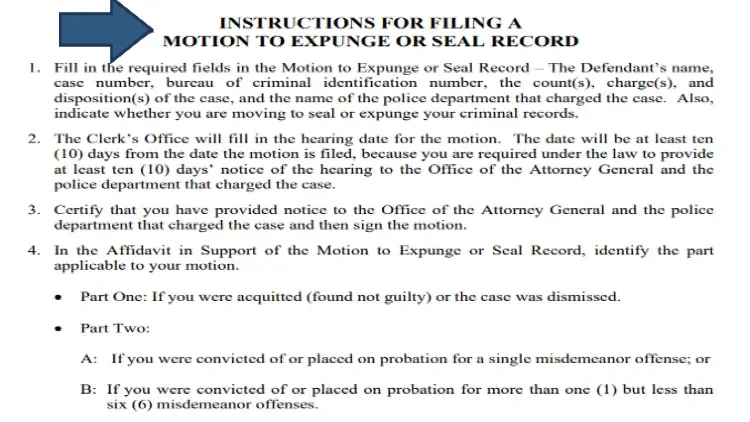
The statute further states that if there is a determination by the court that the arrest was unlawful or based on mistaken identity, the record must be sealed within 60 days of the determination by the court.
South Carolina
South Carolina relief for defendants who are arrested and never charged, have charges dismissed, or are acquitted following a hearing is outlined in South Carolina Statute 17-1-40(B)(1). The statute orders that all records pertaining to the arrest and hearing of the action be destroyed and can only be disclosed pursuant to a court order.
South Carolina law applies automatic expungement in Municipal and Magistrate courts as well for non-convictions after 2 June 2011.
South Dakota
Expungement in South Dakota simply refers to sealing of records, not destruction of records; however, when a non-conviction case has been expunged it is no longer accessible by the public.
Statute 23A-3-27 allows for expungement when one year has passed since the date of arrest with no formal charges filed, one year following the dismissal of the charges by the district attorney, or any time following an acquittal following a hearing.
Tennessee
Tennessee provides relief to persons arrested but not convicted in Tennessee Code 40-32-101(a)(1). Per this law, when a charge has been dismissed, an acquittal has been entered, or the person was arrested but released with no formal charges, that individual can petition to the court to expunge their record.
When the petition is filed and adjudicated, the court orders the destruction of all records of the arrest and/or hearing that resulted in dismissal or acquittal or where charges were never filed, making them inaccessible to the public.
Texas
Article 55.01(A) of the Texas Code allows for expungement of records in cases where a person was arrested and no charges were filed, the matter was dismissed by the district attorney, an acquittal was entered following the trail, or where the individual was pardoned by the governor of the state.
The only exception is when a period of community service was entered as part of a deferred prosecution, unless the charge was a class C misdemeanor. The waiting period is 180 days to three years depending on the nature of the crime.
Individuals must follow the procedures outlined in Article 55.02 of the Texas Criminal Procedure Codes, and once the expungement has been entered pursuant to 55.03, the records cannot be made public and the individual is not required to disclose the arrest.
Utah
In 2019, Utah passed its Clean Slate Act which grants automatic expungements of all arrests that resulted in dismissal, acquittal, or dismissals following successful completion of a pre-trial agreement or deferred prosecution.
Conditions that must be met before the automatic expungement include being free of criminal charges for 5-7 years and do not include felony records, domestic violence charges, sex offenses, or DUI related arrests.
Vermont
Vermont expanded expungement relief in 2018 by amending Senate Bill 173 which eliminated some waiting periods and increased qualifying offenses.
Additionally, per statute Title 13, Section 7603(a),(b), and (e), records are automatically expunged 60 days following dismissal with prejudice before the trial, or an acquittal is entered following a hearing.
One limitation to expungement is if the district attorney files an objection to the sealing or expungement of the record. When this happens, a hearing is conducted to see if sealing or expunging the case serves the interest of justice and sets a timeframe for when the record can be expunged.
Virginia
Code of Virginia 19.2-392.2 outlines expungement of records in the state. Per the statute, a defendant can petition the court to expunge records of an arrest when there has been no conviction, including dismissal of charges, acquittal, or an arrest where no formal charges were filed.
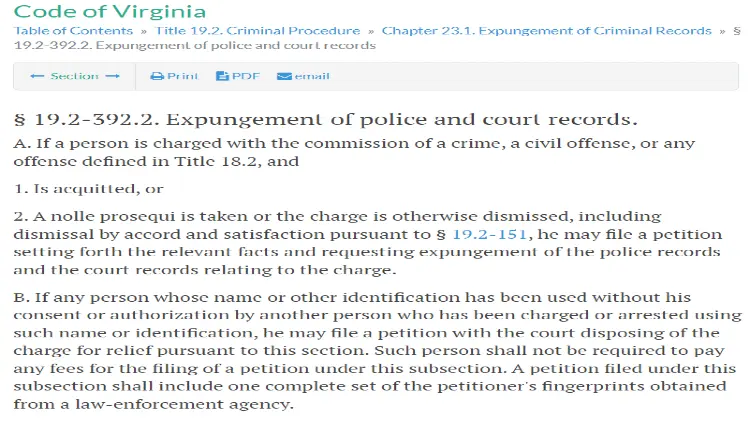
The Code further states that in the event a conviction is vacated through a pardon, the individual does not have to file a petition requesting expungement. The expungement will be automatically executed within the timeframe set by the court.
Per Code of Virginia 19.2-392.4 applicants are not required to disclose any information regarding expunged records, and employers cannot make inquiries about expunged records.
Washington
In Washington State, Revised Code 10.97.050 prohibits disclosure of any non-conviction records to the public, making these records only available to law enforcement or government agencies. This does not cover charges filed within the previous 12 month period that are still pending adjudication.
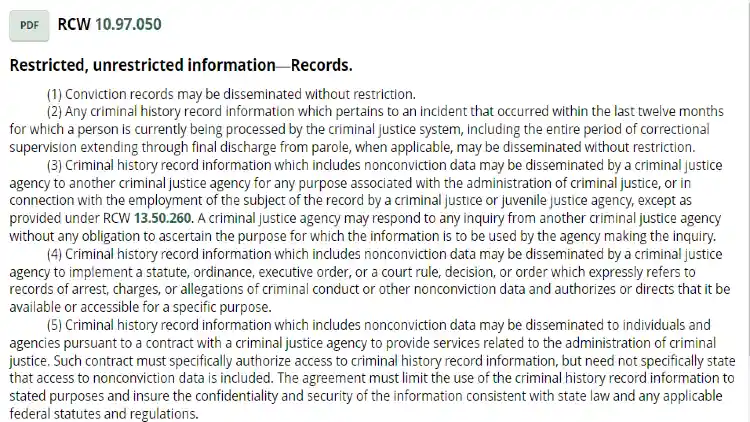
West Virginia
When an arrest results in a non-conviction in West Virginia, the court must advise the defendant of the right to seek expungement immediately following the disposition of the charge whether it is via dismissal with prejudice or an acquittal.
West Virginia Code 61-11-25(a), (b) further states that any agency holding records regarding the matter expunged must certify with the court that the records have been destroyed within six months of the order to expunge. This means that it is possible an expunged arrest can still show up on a background check within that six month period.
Wisconsin
While Wisconsin’s Statute 165.84(1) requires law enforcement to return fingerprints to a person who was arrested and not subsequently charged, or one who was arrested and later acquitted by the court, it does not fully address the matter of dismissed charges.
The state’s Department of Justice, however, has stated that clearing of records for non-conviction matters includes acquittals, dismissals, and charges that are filed but not prosecuted after a two year waiting period. This does not appear to apply to court records, only law enforcement records.8
Wyoming
In Wyoming, a court can order the automatic expungement of non-conviction records per Statute 7-13-1401(a). This applies to charges that are dismissed, where an acquittal is entered after a hearing, and if there are no other pending charges against the defendant. The waiting period is 180 days after the non-conviction is entered by the court.
Information on whether pending charges appear on a background check is relevant, even in states with automatic expungement of non-convictions. Pending charges refer to those that have not been resolved in court and may therefore still be visible on a background check.
Steps to Take if You’re Non-Conviction Arrest Appears On a Background Check
After an arrest record has been expunged, it is crucial to verify that it does not appear on a background check.
If these sealed or restricted records are found to be publicly accessible, individuals should report this to the state’s attorney general. This ensures that any erroneous information is addressed promptly.
The table below lists the attorney general for each state in the United States, along with contact information for that office.
| State Attorney General’s Website Link |
Contact Information |
| Alabama |
501 Washington Ave
Montgomery, Alabama 36104
334-242-7300 |
| Alaska |
1031 West 4th Avenue, Suite 200
Anchorage, Alaska 99501
907-269-5100 |
| Arizona |
2005 North Central Avenue
Phoenix, Arizona 85004-2926
602-542-5025 |
| Arkansas |
323 Center St, #200
Little Rock, AR 72201
501-682-2007 |
| California |
Post Office Box 944255
Sacramento, California 94244-2550
916-210-6276 |
| Connecticut |
165 Capitol Ave.
Hartford, Connecticut 06106
860-808-5318 |
| Delaware |
820 North French Street
Wilmington, Delaware 19801
302-577-8600 |
| Florida |
111 W Madison St, Room #312
Tallahassee, FL 32399-1475
850-488-0021 |
| Georgia |
40 Capitol Sq., Southwest
Atlanta, Georgia 30334
404-458-3600 |
| Hawaii |
425 Queen St
Honolulu, Hawaii 96813
808-586-1500 |
| Idaho |
Post Office Box 83720
Boise, Idaho 83720-0010
208-334-2400 |
| Illinois |
100 W Randolph St
Chicago, Illinois 60601
312-814-3000 |
| Indiana |
302 West Washington Street, 5th Floor
Indianapolis, Indiana 46204
317-232-6201 |
| Iowa |
1305 East Walnut St
Des Moines Iowa 50319
515-281-5164 |
| Kansas |
120 Southwest 10th Avenue, 2nd Floor,
Topeka, Kansas 66612-1597
785-296-2215 |
| Kentucky |
700 Capital Ave, Room 118,
Frankfort, KY 40601
502-696-5300 |
| Louisiana |
PO Box 94005
Baton Rouge, Louisiana 70804
225-326-6079 |
| Maine |
6 State House Station
Augusta, Maine 04333
207-626-8800 |
| Maryland |
200 Saint Paul Pl
Baltimore, Maryland 21202
410-576-6300 |
| Massachusetts |
1 Ashburton Pl, 20th Floor
Boston, Massachusetts 02108
617-727-8400 |
| Michigan |
Post Office Box 30212
Lansing, Michigan 48909
517-335-7622 |
| Minnesota |
445 Minnesota St, Suite 1400
Saint. Paul, Minnesota 55101
651-296-3353 |
| Mississippi |
Post Office Box 220
Jackson, Mississippi 39205
601-359-3680 |
| Missouri |
Post Office Box 899
Jefferson City, Missouri 65102
573-751-3321 |
| Montana |
Post Office Box 200113
Helena, Montana 59620-0113
406-444-3625 |
| Nebraska |
2115 State Capitol
Lincoln, Nebraska 68509
402-471-2683 |
| Nevada |
Grant Sawyer Bldg.
555 East Washington Ave, Suite 3900
Las Vegas, Nevada 89101
702-486-3420 |
| New Hampshire |
33 Capitol St.
Concord, New Hampshire 03301
603-271-3658 |
| New Jersey |
Richard J. Hughes Justice Complex
25 Market Street
Trenton, New Jersey 08611
609-292-4925 |
| New Mexico |
408 Galisteo St
Santa Fe, New Mexico 87501
505-490-4060 |
| New York |
Office of the Attorney General, The Capitol
Albany, New York 12224-0341
800-771-7755 |
| North Carolina |
9001 Mail Service Ctr
Raleigh, North Carolina 27699-9001
919-716-6400 |
| North Dakota |
600 East Boulevard Avenue, Department 125
Bismarck North Dakota 58505
701-328-2210 |
| Ohio |
30 East Broad Street, 14th Floor
Columbus, Ohio 43215
800-282-0515 |
| Oklahoma |
313 Northeast 21st St
Oklahoma City, Oklahoma 73105
405-521-3921 |
| Oregon |
1162 Court Street Northeast
Salem, Oregon 97301-4096
877-877-9392 |
| Pennsylvania |
Strawberry Square, 16th Floor
Harrisburg, Pennsylvania 17120
717-787-3391 |
| Rhode Island |
150 S Main St
Providence, Rhode Island 02903
401-274-4400 |
| South Carolina |
Post Office. Box 11549
Columbia, South Carolina 29211
803-734-3970 |
| South Dakota |
1302 East Highway 14, Suite 1
Pierre, South Dakota 57501-8501
605-773-3215 |
| Tennessee |
Post Office Box 20207
Nashville, Tennessee 37202
615-741-3491 |
| Texas |
Post Office Box 12548
Austin, Texas 78711-2548
512-463-2100 |
| Utah |
350 North State Street, Suite #230
Salt Lake City, Utah 84114
801-366-0260 |
| Vermont |
109 State St
Montpelier, Vermont 05609
802-828-3171 |
| Virginia |
202 North 9th Street
Richmond, VA 23219
804-786-2071 |
| Washington |
Post Office Box 40100
Olympia, Washington 98504-0100
360-753-6200 |
| West Virginia |
Post Office Box 1789,
Charleston, West Virginia 25326
304-558-0546 |
| Wisconsin |
Post Office Box 7857
Madison, Wisconsin 53707-7857
608-266-1221 |
| Wyoming |
2424 Pioneer Ave
Cheyenne, Wyoming 82002
307-777-7886 |
If an individual notice expunged or sealed arrests showing up on a criminal background check, they can also hire an attorney or contact legal aid in their state to get assistance in clearing their record.
A criminal record can significantly affect various aspects of a person’s life, including employment opportunities, housing leases, licensure, and freedom of mobility. Therefore, understanding whether records of arrests without conviction appear on background checks is crucial for informed decision-making.
Frequently Asked Questions
Are Arrests Without Resulting Convictions Visible on Background Checks Conducted in a Different State?
When a background check is a national record search, if the record is generated in a state without automatic relief and the individual has not petitioned the court to have the record expunged or sealed, it can show up on a background check in another state.
Which States Have Automatic Relief For Arrests That Result In Non-Convictions or Other Non-Convictions?
California, Connecticut, Georgia, Illinois, Kentucky, Michigan, Nebraska, New Jersey, New York, North Carolina, North Dakota, Oklahoma, Pennsylvania, South Carolina, South Dakota, Tennessee, Texas, Utah and Virginia all have some relief written into their laws that automatically expunged or seals arrest records that did not result in conviction either through dismissal or acquittal.
1 FBI — Persons Arrested. (n.d.). Crime/Law Enforcement Stats (Uniform Crime Reporting Program). Retrieved October 1, 2022, from <https://ucr.fbi.gov/crime-in-the-u.s/2019/crime-in-the-u.s.-2019/topic-pages/persons-arrested>
2 Enforcement Guidance on the Consideration of Arrest and Conviction Records in Employment Decisions under Title VII of the Civil Rights Act. (2012, April 25). EEOC. Retrieved October 1, 2022, from <https://www.eeoc.gov/laws/guidance/enforcement-guidance-consideration-arrest-and-conviction-records-employment-decisions>
3 Arizona Sealing of Arrest. (n.d.). 13-911 – Sealing of arrest, conviction and sentencing records; requirements; fee; appeal; definition. Retrieved October 1, 2022, from <https://www.azleg.gov/ars/13/00911.htm>
4 Home. (2018, December 5). YouTube. Retrieved October 1, 2022, from <https://www.flsenate.gov/Session/Bill/2019/7125?Tab=BillHistory>
5 Georgia Criminal History Record Restrictions | Georgia Bureau of Investigation. (n.d.). Georgia Bureau of Investigation. Retrieved October 1, 2022, from <https://gbi.georgia.gov/georgia-criminal-history-record-restrictions>
6 20 LC 41 2582S – 1 – The House Special Committee on Access to the Civil Justice System offers the following substitute to SB 288. (n.d.). Georgia General Assembly. Retrieved October 1, 2022, from <https://www.legis.ga.gov/api/legislation/document/20192020/194122>
7 2010 New Hampshire Statutes :: TITLE LXII CRIMINAL CODE :: CHAPTER 651 SENTENCES :: Section 651:5 Annulment of Criminal Records. (n.d.). Justia Law. Retrieved October 1, 2022, from <https://law.justia.com/codes/new-hampshire/2010/titlelxii/chapter651/section651-5/>
8 Wisconsin DOJ. (n.d.). Wisconsin Department of Justice | WisDOJ. Retrieved October 1, 2022, from <https://www.doj.state.wi.us>

